15 dog breeds that are good with cats
20th July, 2020
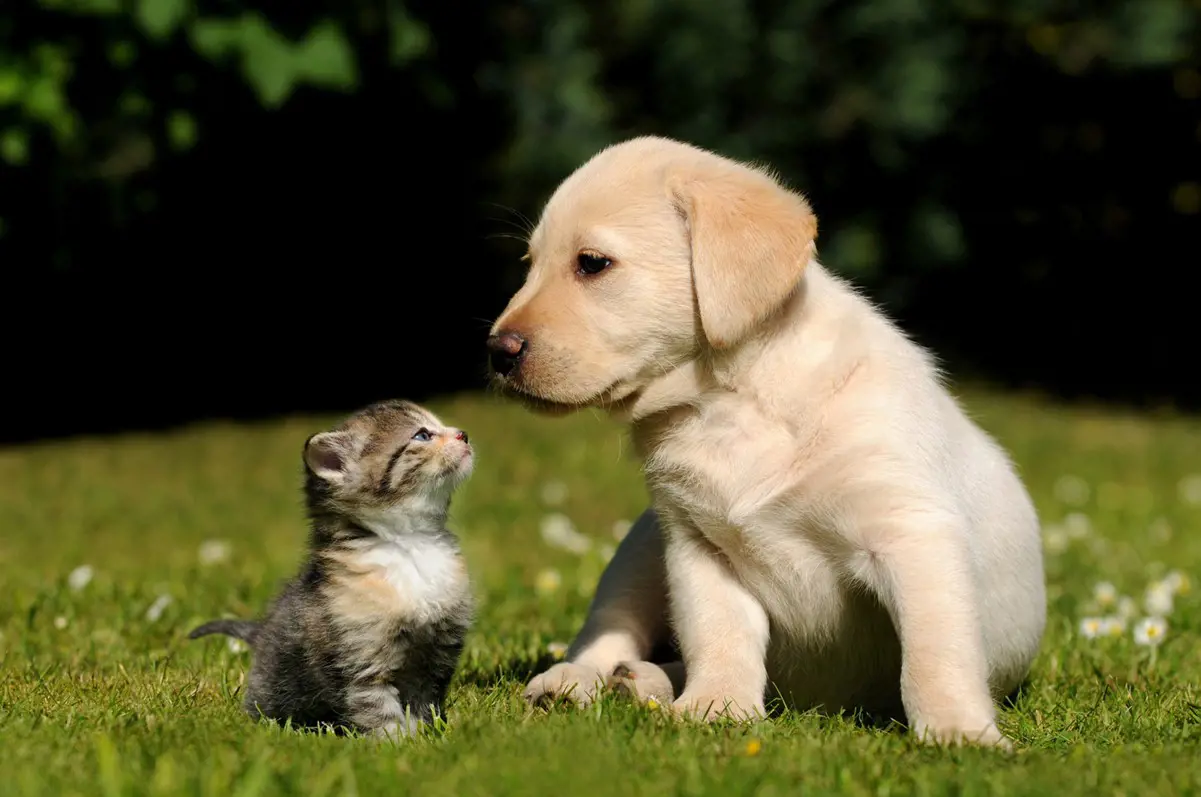
They say that some of us are dog people and some are cat people. But what if you really can’t choose between the two?
In that case, it could be time to start searching for a canine companion for your marvellous moggy. We’ve put together a list of 15 breeds of dog whose arrival in your cat’s life should not make the fur fly.
Remember – disagreements can occur between pets, and can even lead to injury. Purely Pets insurance may help you meet the cost of vet fees if your animals should start to fight like, well, cats and dogs. Good luck!
Beagle
Could a floppy-eared, lovable Beagle be the dog to make friends with your feline? Beagles are famed for their laid-back nature, and are likely to regard your puss as part of their pack.
Beagles hate being left on their own, so will be glad of your cat’s company when you’re out.
In fact, they can even become bored and destructive if left to their own devices, so a cat might be a good calming influence.
Careful, though – they are known escape artists, so if you’re in the habit of opening a door to let your cat out, take care your Beagle doesn’t make a dash for freedom, too!
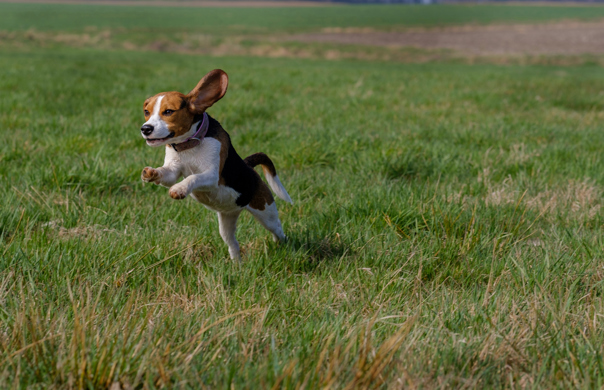
Border Terrier
These scruffy, cheeky pups make a great contrast looks-wise to sleek, elegant cats. And personality-wise, they should rub along just fine.
Their friendly and affectionate nature means they’ll happily accommodate a cat in their lives. They’re quick to learn and eager to obey, so it should be possible to train your Border Terrier how to behave around your cat.
They do require a good deal of exercise, so if you’re used to letting your cat take itself out for walks while you sit on the sofa, you’ll have to adapt your pet-parenting style pretty quickly.
Collie
Rough-coated or Smooth-coated Collies have long been favoured as sheepdogs. But how would they get along with the domestic animals in your home?
Generally, just fine – particularly if they’re brought up together. After all, they’re bred to take care of other animals, keeping them in check but never hurting them.
That herding instinct might prompt them to try to chase or round up your cats, but they’re highly intelligent and quick to pick up new training.
If you invest a little time and effort, your Collie could be good company for a cat.
Corgi
What’s not to love about these low-slung, affectionate animals? Hopefully, your cat will agree, because Corgis really do make excellent family pets.
They’re clever, trainable, and adaptable to many living situations – including homes with other pets.
The big drawbacks with Corgis are probably that they need lots of mental stimulation and physical activity, and they have a loud bark.
But for a large, outdoorsy family with plenty of space, they make an alert guard animal and loving pet.
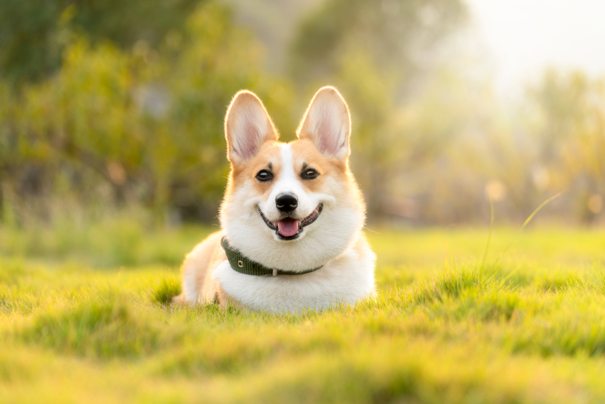
English Springer Spaniel
For many families dreaming of introducing a dog to their home, Springer Spaniels are the breed they imagine. Those floppy ears! Those beseeching eyes!
Springer Spaniels are an affectionate and sociable breed, whose love for exercise will get your family outdoors.
They can certainly make good companions for cats, too. Some moggies might find a young Springer Spaniel somewhat crazy as a housemate, but they’ll soon teach it the meaning of personal space.
A word of warning: this energetic dog was originally bred as a gundog, and will still tear away if it spots something to chase. That instinct can get it into some scrapes, so it’s wise to take out a pet insurance policy to help you cover vets’ fees.
German Shepherd
If you only know these larger canines as guard dogs, you might wonder at the wisdom of homing one with a far smaller pet.
But the reason they’re popular as guard dogs is not just because they’re muscular and agile. It’s also because they are loyal and trainable.
German Shepherds do have a strong prey drive – and you don’t want that prey to be your puss. It’s vital that puppies are socialised at the right age with children and pets.
With this breed, it’s best to introduce them while they’re still at puppy or kitten stage. However, if an adult dog has been socialised well, it should be able to cope calmly with an adult cat.
See below for our tips on how to introduce your pets to one another.
Golden Retriever
You may already know that Golden Retrievers have a reputation for being great with kids. Well, the good news is that their affectionate nature extends towards the feline members of your family, too.
Golden Retrievers are sweet, playful, hard-working and loyal. In fact, they’re all-round wonderful animals – but you will need to give them plenty of exercise to keep them behaving well.
Golden Retrievers have even been known to protect kittens that they regard as theirs, acting as a kind of canine parent figure. How adorable is that?
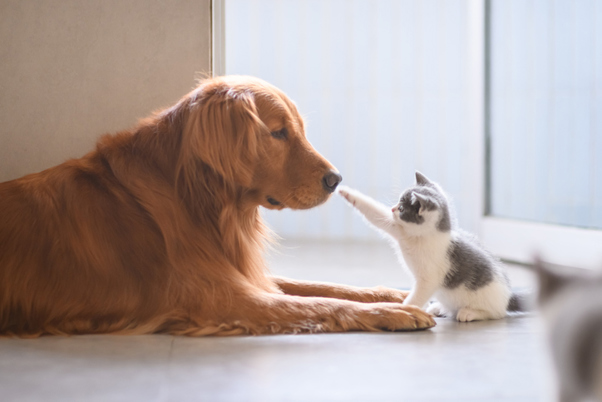
Labrador
A lovely Lab is the dog of choice for many people, thanks to its playful and friendly nature.
Their drive to retrieve is greater than their drive to hunt, so they’re more likely to try to pick up your kitty in their mouth than attack it – but your cat will no doubt object anyway!
It’s essential that these large and energetic animals are socialised as puppies, so they learn how to fit in with your family and your felines.
Like many dogs, Labradors are prone to breed-specific genetic health problems, particularly certain cancers and exercise-induced collapse, which is a screen-able syndrome.
Taking out lifetime insurance for your pet before your Lab displays any symptoms will help you cover vets’ fees.
Maltese
Do you love grooming your pets? If you’re considering buying a fluffy Maltese along with a longhaired Maine Coone, then we certainly hope so.
While Malteses are low-shedding, they do need daily brushing to stop their hair becoming tangled.
Fortunately, they like nothing better than lazing on a sofa while you groom them – and they’re perfectly content to curl up with a kitty, too.
If you have an older cat, a Maltese could well be one of the best breeds to introduce into your home. They won’t disturb your pussycat’s peace, but will just live and let live.
Plus, they’re small. So if you want more pets than your house can really handle, then put a Maltese at the top of your list.
Irish Setter
Irish Setter puppies are handfuls – big, clumsy, and eager to jump up and drool all over you.
So you might think that this pooch is more than enough on its own, and a cat would only add to the mayhem – and you might well be right.
But the clumsy, exuberant adolescent stage doesn’t last forever. Irish Setters are easy to train, and will settle down into obedient, dignified adults.
Their gorgeous, flowing auburn locks make them a popular choice among owners who appreciate canine aesthetics.
What’s more, adult dogs are calm around cats and kids, making them an excellent addition to a busy household filled with multiple small creatures.
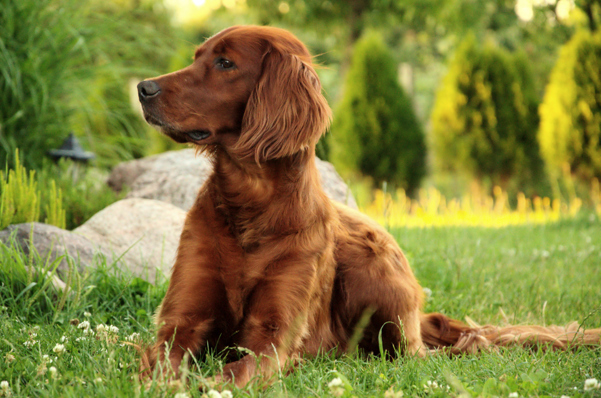
Poodle
If an Irish Setter or a Lab are just too much of a good thing, how about pairing your pussycat with a Poodle?
You can choose from standard, miniature or toy sizes, with the last of those being under 10 inches in height – similar to a cat.
These pint-sized pups are famed for their luxuriant, curled coats, which some owners choose to clip and groom into ornamental styles.
There’s nothing fussy about this breed’s personality though: its name comes from the same root as “puddle”, as they love to splash in water!
Poodles are affectionate, quick to learn, and happy to adapt to many living situations – including sharing space with cats.
If you chose cats because you’re allergic to dogs, then a Poodle is a great choice as its coat is hypoallergenic.
Portuguese Water Dog
Another water-loving dog with a hypoallergenic coat is the Portuguese Water Dog. It’s relatively rare in the UK, but is known for its high intelligence and happy temperament.
These pooches are bouncy, excitable, and love to chew everything! So they’re not for the faint-hearted owner, and they could terrify a timid kitten.
A well-established older cat, though, is likely to be able to hold its own. And these dogs, while boisterous, are easy to train and exceedingly good-natured, so hopefully all your pets will learn to get along.
Pug
Small and compact, a Pug is another space-saving option if you’ve got more room in your heart than your home for your pets.
They’re outgoing, mischievous and adaptable, making them an excellent choice for a multi-pet household.
Pugs are liable to suffer breathing problems due to their short snouts. With pet insurance from Purely Pets, you get access to a 24-Hour Vet Helpline for all your canine health concerns.
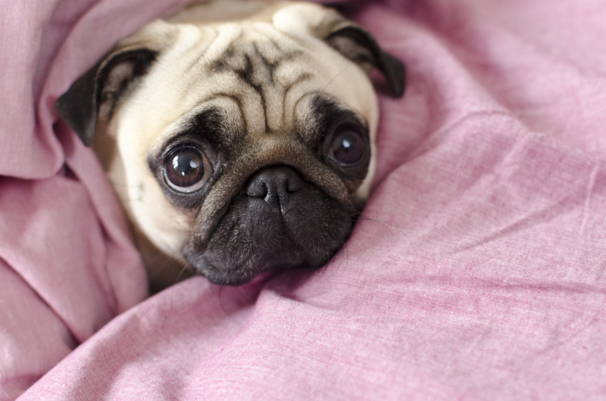
Shetland Sheepdog
One of the most obedient dogs around, this long-haired beauty will be happy to adapt to sharing its space with your felines.
Its rough, dense coat will require a lot of grooming. But what could be nicer than curling up on the sofa, your Sheltie on one side and your moggy on the other, for a spot of coat brushing?
Silky Terrier
Finally, if you chose cats because they don’t require walks, then a Silky Terrier could make a great canine companion for your kitty and you.
While they’ve got a proper Terrier zest for life, they don’t need much exercise. They’re eager to please, so perfectly amenable to living with other pets, including cats.
How to prevent cat and dog fights
As a pet lover, the last thing you want is to see your beloved kitty injured, or your canine clawed. So it pays to put some effort into helping your animals get along with one another.
Often, it’s best to introduce a kitten and a puppy to your household at the same time. If they grow up together, they’ll learn to get along naturally.
If you already have a cat, take an honest look at its temperament. Could it really cope with a new addition to your family? If yes, then go ahead – but cautiously.
First, you need to choose the right dog. We’ve listed some suitable breeds above, but you should also learn everything you can about your prospective pet’s personality, particularly if it’s an older animal.
Then you must handle the introductions correctly. Keep your pets separate at first, while your new addition gets used to its surroundings. Then gradually introduce them to each other’s scent by stroking them in turn.
After a few days, let the animals see and sniff each other, keeping them separated by a stairgate and always ensuring that both pets have a safe place they can retreat to.
Once they are comfortable with each other, you can allow them to be in the same space, but don’t leave them alone until you’re sure there will be no disagreements.
Going forward, take your puppy to training classes so it learns how to behave and obey your commands.
Keep your cat’s food and litter tray out of reach of the dog, and make sure both animals have private spaces just for them.
With these elements in place, your cat and dog should learn to tolerate one another – and hopefully even become best friends.
If you still have trouble, seek help from a dog trainer or behavioural specialist. Your vet should be able to advise.
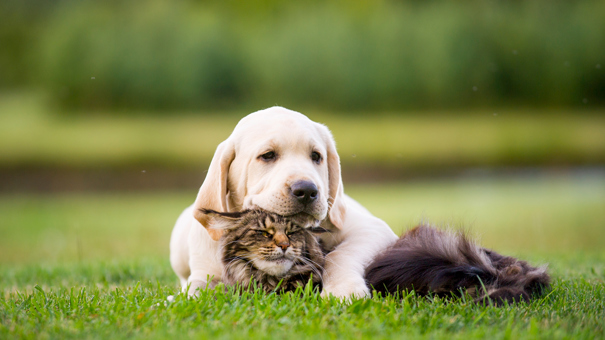
Get a quote from Purely Pets
As a responsible pet owner, you want to ensure your animals are happy and healthy. At Purely Pets, we know how important your pets are to you, so we’ve designed 15 levels of lifetime pet insurance.
Our multi-pet insurance policies will help you care for both dogs and cats, and can include cover for vets’ fees from £1,000 to £15,000 per year.
Get a quote from Purely Pets today to keep your menagerie covered!
Helpful Pages
Recent Posts
Pet Insurance Quote
- 98% claims paid *
- Claims paid directly to vets
- 24/7 vet video consultations
- Interest free monthly payments




